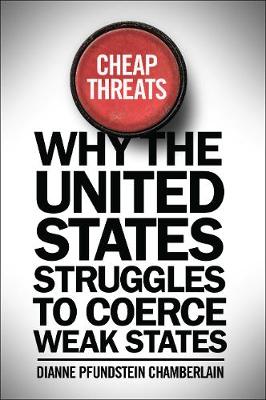
Stock image for illustration purposes only - book cover, edition or condition may vary.
Cheap Threats: Why the United States Struggles to Coerce Weak States
Dianne Pfundstein Chamberlain
€ 205.39
FREE Delivery in Ireland
Description for Cheap Threats: Why the United States Struggles to Coerce Weak States
Hardback. Why do weak states frequently resist threats of force from the United States? The author draws on an original dataset on US compellence from 1945 to 2007 and case studies of Cuba (1962), Iraq (1991), Iraq (2003), and Libya (2011) to explain the conundrum. Num Pages: 288 pages, 1 figures, 18 tables, 1 figure, 18 tables. BIC Classification: 1KBB; JPSD; JWK. Category: (P) Professional & Vocational. Dimension: 229 x 152 x 18. Weight in Grams: 551.
Why do weak states resist threats of force from the United States, especially when history shows that this superpower carries out its ultimatums? Cheap Threats upends conventional notions of power politics and challenges assumptions about the use of compellent military threats in international politics. Drawing on an original dataset of US compellence from 1945 to 2007 and four in-depth case studies -- the Cuban Missile Crisis, the 2011 confrontation with Libya, and the 1991 and 2003 showdowns with Iraq -- Dianne Pfundstein Chamberlain finds that US compellent threats often fail because threatening and using force became comparatively cheap ... Read more
Why do weak states resist threats of force from the United States, especially when history shows that this superpower carries out its ultimatums? Cheap Threats upends conventional notions of power politics and challenges assumptions about the use of compellent military threats in international politics. Drawing on an original dataset of US compellence from 1945 to 2007 and four in-depth case studies -- the Cuban Missile Crisis, the 2011 confrontation with Libya, and the 1991 and 2003 showdowns with Iraq -- Dianne Pfundstein Chamberlain finds that US compellent threats often fail because threatening and using force became comparatively cheap ... Read more
Product Details
Publisher
Georgetown University Press
Format
Hardback
Publication date
2016
Condition
New
Weight
551g
Number of Pages
288
Place of Publication
Washington, DC, United States
ISBN
9781626162822
SKU
V9781626162822
Shipping Time
Usually ships in 15 to 20 working days
Ref
99-2
About Dianne Pfundstein Chamberlain
Dianne Pfundstein Chamberlain is a research fellow at the Arnold A. Saltzman Institute of War and Peace Studies at Columbia University.
Reviews for Cheap Threats: Why the United States Struggles to Coerce Weak States
Students, scholars, and general readers should find the work useful, while policy makers should pay particular attention to the book's implications for diplomacy.
MCU Journal In this fascinating and carefully argued study, Pfundestein Chamberlain puts forward a costly compellence theory.
Foreign Affairs
MCU Journal In this fascinating and carefully argued study, Pfundestein Chamberlain puts forward a costly compellence theory.
Foreign Affairs
